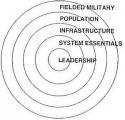Sorry Steve but i dont buy your answer. I have a much more cynical view as to why the manual left out St Carl from its classic reading list and this was confirmed to me by an individual who was involved in the writing. That the writers (not the busy-body writers but the rock-star types) wanted to bludgeon the conventionally minded, big-battle focussed hard-wired officers (i guess like me) out of the darkness of our cold-war mindset and into the light of Galula-like coin operations. That is why St Carl was removed. In my mind, absurd and inexecusable. How does our army forsake the brilliance and immediate relevance of Clausewitz, in any kind of war, for the pop-theories of the armed social scientists?
Also Steve do you really mean that Coin is not war "at the strategic level?" I wonder if General Patreaus would agree with that statement since he is our strategic general in command in Iraq? I imagine from time to time on Victory Base in Baghdad he has attended memorial ceremonies for dead american service men and women killed in action in Iraq. Hard to believe that he would think that he is not at war.
good luck at your conference.
gian








 you probably would not recongnize it. As for Slapout we are coming right along we now have our own Subway, 2 gas stations, and there is talk of changing the caution light to a real stoplight because of traffic congestion.
you probably would not recongnize it. As for Slapout we are coming right along we now have our own Subway, 2 gas stations, and there is talk of changing the caution light to a real stoplight because of traffic congestion.

 .
. .
.



Bookmarks